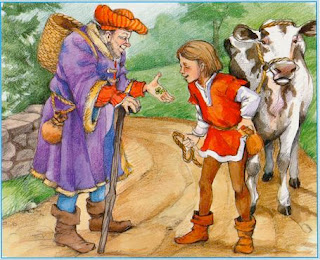All of us have giants to face.
Maybe you are a 69-year-old retiree
with chronic health problems. Maybe you are a 52-year-old man whom your
employer as laid off and you have trouble getting interviews. Maybe you are a
45-year old woman, struggling with guilt about choices she made as a young
adult. Maybe you are a 33-year-old immigrant with a minimum-wage job and a
family many thousands of miles away. Maybe you are a 25-year-old with the
beginnings of a drinking problem. Maybe you are a teenager feeling the
out-of-control expectations of his parents.
I invite you to think about
illness, unemployment, guilt, separation, substance abuse, and the expectations
of others. If you face them, every one of them is a giant.
So let us talk about giants.
I invite you to think about an
interesting take on the well-known fable in a movie released on March 1, 2013: Jack the Giant Slayer.
You know the story of Jack and the
Beanstalk.[1]
Jack is a boy who lives with his
widowed mother, with nothing to support them but a cow. When the cow stops
giving milk, mom sends Jack to the market to sell it. On the way, he meets a
man who offers him a handful of magic beans in exchange for the cow. This proves
to be a big mistake. When he arrives home without money, his mother is furious.
She throws the beans out the window and sends Jack to bed without supper. Then,
while they are sleeping, the beans grow into an enormous beanstalk, reaching up
to a land high in the sky. Jack climbs the beanstalk and discovers the castle
of a giant. He breaks into the castle. Soon, the giant returns home. He senses
that Jack is nearby, and speaks a rhyme:
Fee-fi-fo-fum!
I smell the blood of an Englishman,
[We find these
lines in King Lear (Act 3, Scene 4)
as well]
Be he alive, or be he dead,
I'll grind his bones to make my
bread.
The giant falls asleep, so he steals a bag of gold coins
this time, a goose that lays a golden egg, and a harp that plays by itself. Eventually,
the giant chases Jack down the beanstalk. The boy makes it down first, asks his
mother for an axe, and chops down the beanstalk -- killing the giant. Jack and
his mother live happily ever after with the riches that Jack stole.
Jack becomes the Giant Slayer!
This type of story is more about
the cunning needed by the small and insignificant in a world full of “giants,”
whether they are economic or political giants. You know the stories, such as stealing
treasure from the big dragon or some other monster. We miss the point if we
turn it into a morality tale. In fact, the only way to do so is to make the
giant bad so that he deserves what he gets. Still, granting that he showed
resourcefulness and cunning, do we really want to lift up this boy as a role
model? He shows terrible judgment in exchanging a cow for magic beans, and then
steals from a giant before he kills him. We can certainly sympathize with Jack
as he runs for his life from the angry giant, but we have to admit that he
brought much of his trouble on himself.
Jack is not innocent. He is a
sinner.
Just like us.
Yet, we desperately want to see
Jack as a hero. It at least appears that is why someone re-wrote the fable for the
movie Jack the Giant Slayer. The story
becomes a major morality tale. In this new take on the fairy tale, Jack is a
young farmhand who unwittingly opens a gateway between Earth and a land of
fearsome giants. Led by their two-headed leader, the giants are determined to
gain control of Earth, and they kidnap a princess as part of their invasion.
Jack leads an expedition to rescue the princess, entering an epic battle that
will shape the destiny of people everywhere.
Suddenly, the impossible has become
possible. Jack has become a hero -- not a cunning kid who slyly defeated his
giant, or even a kid with poor judgment and a touch of kleptomania. We all want
a champion who makes the impossible, possible; to make the improbable,
probable; who slays our giants, and make us feel good about ourselves because
we just might be able to emulate them.
I guess I could be more direct at
this point. The suffering and evil we find in this world are giants. It sure
would be nice to have a giant slayer.
Do we want God to fill that role?
Do we want Jesus to fill that role?
[1] This version is from an annotated version of the
story told by Joseph
Jacobs and you can find a simpler version here.


No comments:
Post a Comment